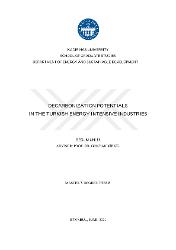| dc.contributor.advisor | Kirkil, Gökhan | en_US |
| dc.contributor.author | Ünlü, Begüm | |
| dc.date.accessioned | 2022-03-16T13:22:03Z | |
| dc.date.available | 2022-03-16T13:22:03Z | |
| dc.date.issued | 2021 | |
| dc.identifier.uri | https://hdl.handle.net/20.500.12469/4275 | |
| dc.description.abstract | Biyoçeşitlilik ve iklim krizi ile mücadelede uluslararası kuruluşların önderliğinde küresel ısınmayı minimumda tutmak üzere bir dizi önlem alınmaktadır. Önlemlerden biri olan sera gazı emisyonlarının azaltılması için öncelikle enerji sektöründe yoğun karbonlu kaynaklardan düşük karbonlulara geçiş sağlanmaktadır. Lakin sadece enerji geçişinin emisyonları azaltmak için yeterli olmadığı bilinmektedir. Bu nedenle küresel emisyon salınımında enerjiden sonra ikinci sırada gelen sanayi sektöründe karbonsuzlaştırma yöntemlerine ağırlık verilmektedir. Çoğu gelişmiş ülkenin çalışmalarında Enerji Yoğun Endüstri olarak sınıflandırılan, üretim sürecinde yoğun enerji harcayan ve yoğun emisyona sebep olan alt sektörlere özel karbonsuzlaştırma önerileri kapsamlı bir şekilde ele alınmaktadır. Türkiye Sanayisi ise teknolojik araştırma ve geliştirmeleri enerji verimliliğine odaklanarak gerçekleştirmektedir. Karbonsuzlaştırma seçenekleri enerji verimliliğini de içine alan geniş bir yelpaze sunduğu için Türk Sanayisi tarafından da benimsenmelidir. Bu çalışma Türkiye'de üretim yapan enerji yoğun endüstrilerde karbonsuzlaştırma potansiyelini sunmayı amaçlamıştır. Çalışmada öncelikle karbonsuzlaştırma kavramı ve iklim krizi ile mücadalede ön saflarda yer alan uluslarası kuruluşların karbonsuzlaştırmaya bakış açısı incelenmiştir. Ardından küresel çapta uygulanan karbonsuzlaştırma seçenekleri araştırılıp enerji yoğun endüstrilere özel çözümler saptanmıştır. Daha sonra Türkiye'de enerji yoğun endüstriler alt sektör bazında incelenmiş ve uygun olan karbonsuzlaştırma önerileri sunulmuştur. Bu önerilerin hayata geçmesi için hükümetin, kuruluş ve sanayicilerin iklim krizi ile mücadelede küresel hedeflere uygun, ortak bir yaklaşım benimsemesi gerekmektedir. Ancak bu sayede sanayide karbonsuzlaştırma seçeneklerinin değerlendirilmesi mümkün olabilecektir. | en_US |
| dc.description.abstract | In the fight against biodiversity and climate crises, a series of measures are taken to keep global warming to a minimum under the leadership of international organizations. In order to reduce greenhouse gas emissions, which is one of the measures, first of all, in the energy sector, a transition from high-carbon sources to low-carbon ones is provided. However, it is known that energy transition alone is not enough to reduce emissions. For this reason, decarbonization methods are emphasized in the industry sector, which ranks second after energy in global emissions. In the studies of developed countries, specific decarbonization proposals for the sub-sectors classified as Energy Intensive Industries consume high energy in the production process and cause intense emissions discussed in detail. On the other hand, The Turkish Industry carries out technological research and development by focusing on energy efficiency. The Turkish Industry should also adopt decarbonization options, as they offer a wide range of options, including energy efficiency. This study aimed to present the potential of decarbonization in energy-intensive industries producing in Turkey. In the study, the concept of decarbonization and the perspective of international organizations, which are at the forefront in the fight against the climate crisis, are examined. Then, decarbonization options that applied globally were investigated, and specific solutions for energy-intensive industries were determined. At the end of the study, the energy-intensive industries in Turkey were examined on a sub-sector basis, and appropriate decarbonization proposals were presented. For these proposals to be implemented, the government, organizations and industrialists should adopt a common approach in line with global targets to fight against the climate crises. Only in this way will it be possible to evaluate decarbonization options in the industry. | en_US |
| dc.language.iso | eng | en_US |
| dc.publisher | Kadir Has Üniversitesi | en_US |
| dc.rights | info:eu-repo/semantics/openAccess | en_US |
| dc.subject | Endüstri ve Endüstri Mühendisliği | en_US |
| dc.subject | Industrial and Industrial Engineering | en_US |
| dc.subject | Enerji | en_US |
| dc.subject | Energy | en_US |
| dc.subject | Alternatif enerji kaynakları | en_US |
| dc.subject | Alternative energy resources | en_US |
| dc.subject | Ağır sanayi | en_US |
| dc.subject | Heavy industry | en_US |
| dc.subject | Demir çelik endüstrisi | en_US |
| dc.subject | Iron steel industry | en_US |
| dc.subject | Enerji verimliliği | en_US |
| dc.subject | Energy efficiency | en_US |
| dc.subject | Enerji yoğunluğu | en_US |
| dc.subject | Energy intensity | en_US |
| dc.subject | Gaz emisyonu | en_US |
| dc.subject | Gas emission | en_US |
| dc.subject | Kağıt endüstrisi | en_US |
| dc.subject | Paper industry | en_US |
| dc.subject | Kimya endüstrisi | en_US |
| dc.subject | Chemical industry | en_US |
| dc.subject | Yenilenebilir enerji | en_US |
| dc.subject | Renewable energy | en_US |
| dc.subject | Çimento endüstrisi | en_US |
| dc.subject | Cement industry | en_US |
| dc.title | Decarbonization potentials in the Turkish energy intensive industries | en_US |
| dc.title.alternative | Türkiye'nin enerji yoğun endüstrilerinde dekarbonizasyon potansiyelleri | en_US |
| dc.type | masterThesis | en_US |
| dc.authorid | 0000-0001-6687-100X | en_US |
| dc.department | Enstitüler, Lisansüstü Eğitim Enstitüsü, Sürdürülebilir Enerji Ana Bilim Dalı | en_US |
| dc.institutionauthor | Ünlü, Begüm | en_US |
| dc.relation.publicationcategory | Tez | en_US |
| dc.identifier.yoktezid | 699631 | en_US |
















